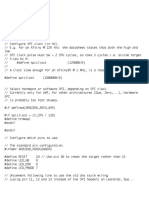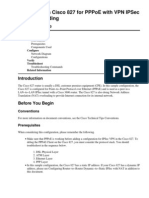SPI Code
Uploaded by
Ali NasserSPI Code
Uploaded by
Ali Nasser/* SPI_master.v - Verilog source for SPI module Features: - 25 MHz max operating frequency (on Xport 2.
0) - 8-bit Clock divider to obtain slower speeds - Synthesizable and tested on Xport 2.0 Limitations: - Only supports master mode - Only supports MSB first data read/write - Only supports sampling on rising edge and setup on falling edge - Only 8-bit data transfers - no IRQ support but has a busy bit that can be polled to assure module is not busy - !SS pin has to be controlled by GPIO Copyright (C) 2007 Steven Yu
This program is free software: you can redistribute it and/or modify it under the terms of the GNU General Public License as published by the Free Software Foundation, either version 3 of the License, or (at your option) any later version. This program is distributed in the hope that it will be useful, but WITHOUT ANY WARRANTY; without even the implied warranty of MERCHANTABILITY or FITNESS FOR A PARTICULAR PURPOSE. See the GNU General Public License for more details. You should have received a copy of the GNU General Public License along with this program. If not, see <http://www.gnu.org/licenses/>. */
module spi_master(addr, in_data, out_data, rd, wr, cs, clk, miso, mosi, sclk); input wire [1:0] addr; input wire [7:0] in_data; output reg [7:0] out_data; input wire rd; input wire wr; input wire cs; input wire clk; inout miso; inout mosi; inout sclk; reg sclk_buffer = 0; reg mosi_buffer = 0; reg busy = 0; reg reg reg reg reg [7:0] [7:0] [7:0] [7:0] [4:0] in_buffer = 0; out_buffer = 0; clkcount = 0; clkdiv = 0; count = 0;
always@(cs or rd or addr or out_buffer or busy or clkdiv)
begin out_data = 8'bx; if(cs && rd) begin case(addr) 2'b00: begin out_data = out_buffer; end 2'b01: begin out_data = {7'b0, busy}; end 2'b10: begin out_data = clkdiv; end endcase end end always@(posedge clk) begin if(!busy) begin if(cs && wr) begin case(addr) 2'b00: begin in_buffer = in_data; busy = 1'b1; end 2'b10: begin clkdiv = in_data; end endcase end end else begin clkcount = clkcount + 1; if(clkcount >= clkdiv) begin clkcount = 0; if((count % 2) == 0) begin mosi_buffer = in_buffer[7]; in_buffer = in_buffer << 1; end if(count > 0 && count < 17) begin sclk_buffer = ~sclk_buffer; end count = count + 1; if(count > 17) begin count = 0; busy = 1'b0; end end end end always@(posedge sclk_buffer) begin out_buffer = out_buffer << 1; out_buffer[0] = miso;
end assign sclk = sclk_buffer; assign mosi = mosi_buffer; endmodule
You might also like
- MA5800 Padrao Configuracao SRL MA5800V100R019C12SPH203.v30% (1)MA5800 Padrao Configuracao SRL MA5800V100R019C12SPH203.v315 pages
- Lab 2 - Uso de Display 7 Segmentos en Arduino. Entradas AnalogicasNo ratings yetLab 2 - Uso de Display 7 Segmentos en Arduino. Entradas Analogicas27 pages
- W5500 UDP Problem - Open Hardware - W5500 Ethernet Shield - WIZnet Developer ForumNo ratings yetW5500 UDP Problem - Open Hardware - W5500 Ethernet Shield - WIZnet Developer Forum8 pages
- 15.3.1 New Spi Slave Module Port List: Two-Way Communications With Your Raspberry Pi: SpiNo ratings yet15.3.1 New Spi Slave Module Port List: Two-Way Communications With Your Raspberry Pi: Spi5 pages
- Using The Serial Peripheral Interface (SPI) Module On 68HC (9) 08 MicrocontrollersNo ratings yetUsing The Serial Peripheral Interface (SPI) Module On 68HC (9) 08 Microcontrollers8 pages
- Home Archive Contact Subscribe: Miłosz OrzełNo ratings yetHome Archive Contact Subscribe: Miłosz Orzeł9 pages
- Shri Ramdeobaba College of Engineering andNo ratings yetShri Ramdeobaba College of Engineering and18 pages
- C-Code Software Routines For Using The SPI Interface On The MAX7456 On-Screen Display100% (2)C-Code Software Routines For Using The SPI Interface On The MAX7456 On-Screen Display9 pages
- thiết kế và mô phỏng khối RAM 32x8 bit có 2 cổngNo ratings yetthiết kế và mô phỏng khối RAM 32x8 bit có 2 cổng4 pages
- STM32 Tutorial 04 - I2C Module (Pca9685) Using HAL (And FreeRTOS)100% (1)STM32 Tutorial 04 - I2C Module (Pca9685) Using HAL (And FreeRTOS)6 pages
- Module 3 STP and RSTP: Lab 3-1 Configuring STP Learning ObjectivesNo ratings yetModule 3 STP and RSTP: Lab 3-1 Configuring STP Learning Objectives28 pages
- Configuring A Cisco 827 For Pppoe With VPN Ipsec Nat OverloadingNo ratings yetConfiguring A Cisco 827 For Pppoe With VPN Ipsec Nat Overloading9 pages
- 8J-ESP8266 SPI-WiFi Passthrough 2-Interrupt Mode en v1.0No ratings yet8J-ESP8266 SPI-WiFi Passthrough 2-Interrupt Mode en v1.011 pages
- 16 BIT MICROPROCESSOR Project Najaf AbbasNo ratings yet16 BIT MICROPROCESSOR Project Najaf Abbas11 pages
- Solucionario MT 127 Sustitutorio 2019 3No ratings yetSolucionario MT 127 Sustitutorio 2019 315 pages
- Arduino Arduino Arduino Arduino 2 2 2 2 Channel Channel Channel Channel Relay Relay Relay Relay Shield Shield Shield ShieldNo ratings yetArduino Arduino Arduino Arduino 2 2 2 2 Channel Channel Channel Channel Relay Relay Relay Relay Shield Shield Shield Shield8 pages
- CISCO PACKET TRACER LABS: Best practice of configuring or troubleshooting NetworkFrom EverandCISCO PACKET TRACER LABS: Best practice of configuring or troubleshooting NetworkNo ratings yet



























































